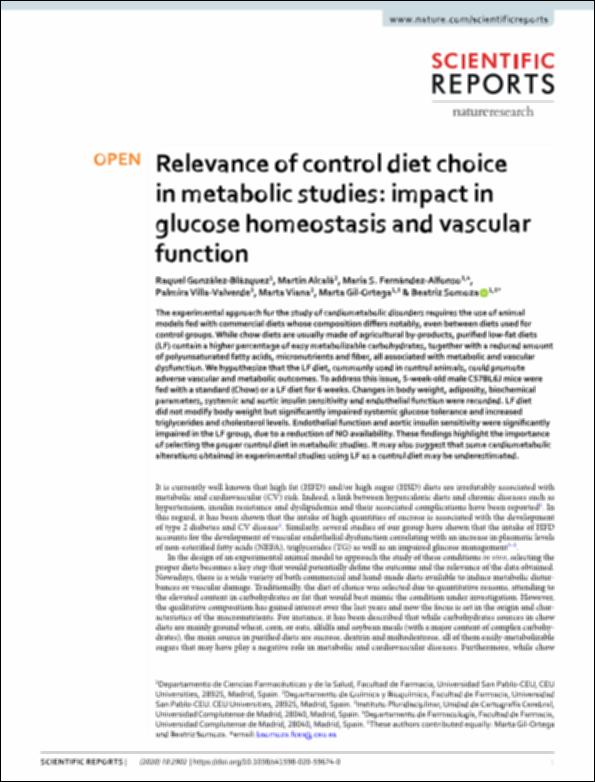Por favor, use este identificador para citar o enlazar este ítem:
http://hdl.handle.net/10637/14533Relevance of control diet choice in metabolic studies: impact in glucose homeostasis and vascular function
| Título : | Relevance of control diet choice in metabolic studies: impact in glucose homeostasis and vascular function |
| Autor : | González Blázquez, Raquel Alcalá Díaz-Mor, Martín Fernández Alfonso, María Soledad Villa Valverde, Palmira Viana Arribas, Marta Gil Ortega, Marta Somoza Hernández, Beatriz |
| Materias: | Cardiometabolic disorders; Commercial diets |
| Editorial : | Nature |
| Citación : | González-Blázquez, R., Alcalá, M., Fernández-Alfonso, M.S. et al. Relevance of control diet choice in metabolic studies: impact in glucose homeostasis and vascular function. Sci Rep 10, 2902 (2020). https://doi.org/10.1038/s41598-020-59674-0 |
| Resumen : | The experimental approach for the study of cardiometabolic disorders requires the use of animal models fed with commercial diets whose composition differs notably, even between diets used for control groups. While chow diets are usually made of agricultural by-products, purified low-fat diets (LF) contain a higher percentage of easy metabolizable carbohydrates, together with a reduced amount of polyunsaturated fatty acids, micronutrients and fiber, all associated with metabolic and vascular dysfunction. We hypothesize that the LF diet, commonly used in control animals, could promote adverse vascular and metabolic outcomes. To address this issue, 5-week-old male C57BL6J mice were fed with a standard (Chow) or a LF diet for 6 weeks. Changes in body weight, adiposity, biochemical parameters, systemic and aortic insulin sensitivity and endothelial function were recorded. LF diet did not modify body weight but significantly impaired systemic glucose tolerance and increased triglycerides and cholesterol levels. Endothelial function and aortic insulin sensitivity were significantly impaired in the LF group, due to a reduction of NO availability. These findings highlight the importance of selecting the proper control diet in metabolic studies. It may also suggest that some cardiometabolic alterations obtained in experimental studies using LF as a control diet may be underestimated. |
| URI : | http://hdl.handle.net/10637/14533 |
| Derechos: | http://creativecommons.org/licenses/by-nc-nd/4.0/deed.es openAccess |
| Fecha de publicación : | 19-feb-2020 |
| Centro : | Universidad San Pablo-CEU |
| Aparece en las colecciones: | Facultad de Farmacia |
Los ítems de DSpace están protegidos por copyright, con todos los derechos reservados, a menos que se indique lo contrario.


